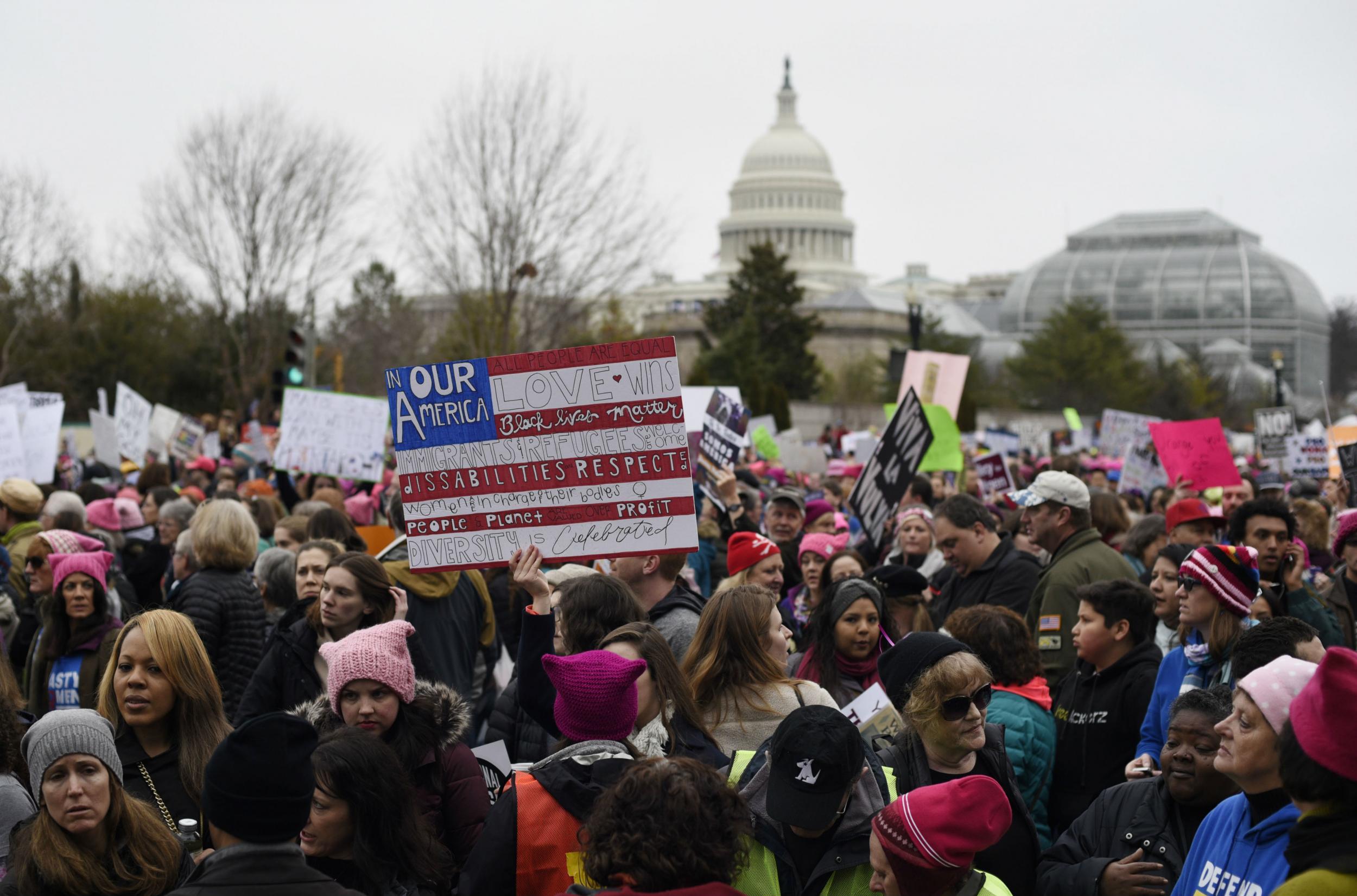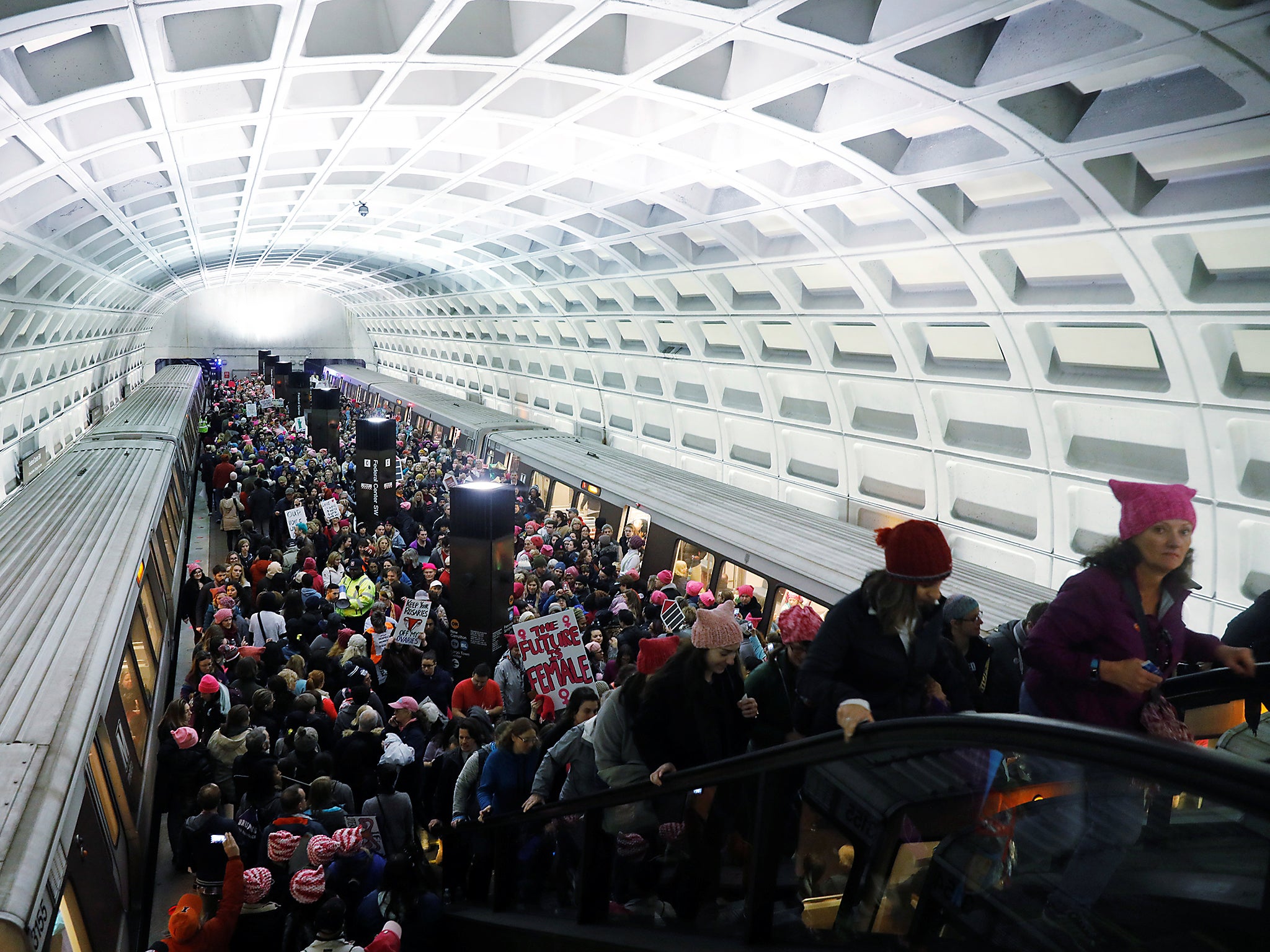Women's March on Washington: Hundreds of thousands come together in act of defiance and unity
The crowds were reportedly double the size that turned out for Mr Trump's inauguration
They started gathering before dawn, before the mist and fog had unwrapped itself from around the Washington Memorial.
They had arrived in planes and and trains and buses, packed themselves into cars and jumped onto the highway, and when they reached the nation’s capital they smilingly squeezed themselves and their banners into subway carriages, or else made their way on foot.
Organisers of the Women’s March on Washington had hoped that up to 200,000 people would come. In the end, officials estimated that 500,000 or more showed up – far larger than the crowds who attended Donald Trump’s inauguration the day before, and so big that officials were obliged to change the route and rule out a march towards the White House.

Over the decades, the National Mall has been home to some extraordinary scenes, from Martin Luther King’s “Dream speech” in 1963, Louis Farrakhan’s Million Man March in 1995, through to the jam-packed celebratory scenes following the swearing-in of Barack Obama in January 2009.
On Saturday, the sight was no less startling, as hundreds of thousands of men and women, many of them wearing pink, pointed-eared “pussyhats” came together in an act of defiance and unity.
The messages they wanted to express and the placards they bore varied. But one common theme of the protest was that Mr Trump’s agenda would not go unchallenged for the next four years, especially when it related to women.
“We march today for the moral core of this nation, against which our new president is waging a war,” said actress America Ferrera.
“Our dignity, our character, our rights have all been under attack, and a platform of hate and division assumed power yesterday. But the president is not America. We are America, and we are here to stay.”

The march in Washington was one of hundreds taking place across the country and around the world. Demonstrators gathered in every US state, in London, Paris and Sydney. There were even a small group of marchers in Paradise Bay, a corner of Antarctica.
In all, the number of “sister” marches was expected to top 600. Organisers said that up to three million people would be involved globally.
After several hours of speeches, and as movement in the Mall began to get difficult, the marchers set off. People clapped and cheered as they made their way west, heading for Independence Avenue.
Francis Clark, 50, a speech therapist from New York, said she did not feel she had a choice but to attend.
“People’s voices are not rising, those in power are not listening,” she said. “The first thing that Mr Trump did was to end the mortgage premium cuts, making it harder for someone to own a home. It’s betrayal from day one.”

Michelle Fortin had come from British Columbia, Canada. She was anxious about what Mr Trump would do to push back LGBT rights, reproductive rights and fail to fund education.
She said there was nothing about his proposals or personality that she liked. “The only good thing is that he has emboldened us to get busy,” she said.
The marchers were young and old, black and white, people of different religions and sexual orientation. Many mothers had come with their daughters. Frequently, three women together indicated a grandmother-mother–daughter combination.
And their chants varied constantly. “Black Lives Matter”, “We want a leader, not a creepy tweeter”, and the call-and-response of “Tell me what democracy looks like – this is what democracy looks like”.
One woman who said she had grown up around the struggle for the right to choose, as cemented by the 1973 Roe v Wade Supreme Court ruling, said it was appalling that her daughter’s generation may be having to refight those same battles. She carried a sign that read: “We should not be having to do this.”
Tamara Beus was walking with her husband. She said the issues that trouble her about Mr Trump’s coming presidency, were too many to list. But she said she was particularly worried about press freedom, the likely repeal of the Affordable Care Act, and a “hate and fear” that had been given such a voice.
“I think the damage he could do is great.” said Ms Beus, from San Diego.
Victoria Pauley had arrived that morning on a bus from Augusta, Georgia, a journey that had taken her ten hours. She had got in at 10am, and the bus was leaving again at 7pm.
She said that living in a so-called red state, she – unlike millions of Americans – was not surprised by Mr Trump’s victory.
But she had a message for him, all the same. “I think Trump and I think Mike Pence might be even more of a threat,” she said, referring to the Vice President, who has a long record of opposing reproductive services and opposing the LGBT community. “I fear he is going to take away our rights.”
Join our commenting forum
Join thought-provoking conversations, follow other Independent readers and see their replies
Comments
Bookmark popover
Removed from bookmarks